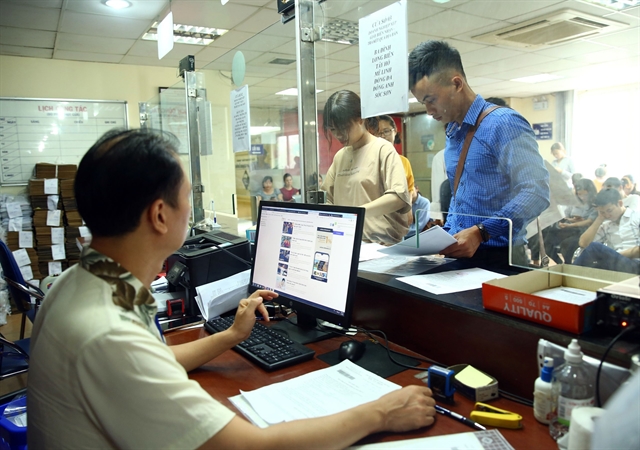 Economy
Economy


|
| Hà Nội Business Registration Office's staff solve legal procedure for businesses. — VNA/VNS Photo Danh Lam |
HÀ NỘI — Amid the complex developments of the COVID-19 pandemic in Việt Nam, ministries and localities are urgently implementing action programmes to sustain economic growth while keeping the disease at bay.
The solutions being used, focusing on investment, exports and consumption, are in line with Government two policies – Resolution 01/NQ-CP and Resolution 02/NQ-CP issued early this year – which outlined the main tasks to implement the socio-economic development plan and the State budget estimate in 2021, as well as improve the business environment to ensure the “dual goals” of fighting the pandemic and promoting economic growth.
In its action plan, the Ministry of Finance defined a group of tasks for allocating resources and implementing solutions including financial measures, State funding, prices, taxes, fees and charges to tackle difficulties for businesses and workers whose jobs have been affected and help restore production and businesses for areas hit hard by the pandemic such as services, travel, aviation and industries.
The Ministry of Planning and Investment is monitoring the domestic and international situation to analyse, forecast and build growth scenarios and measures to respond to fluctuations.
The Ministry of Industry and Trade has managed market development, stimulating consumption demand and supporting export enterprises to expand markets through e-commerce, cross-border trade and promoting 4.0 technology.
Meanwhile, fiscal and monetary policies are being used flexibly to stabilise the macro-economy and stimulate growth.
The State Bank in January issued Directive No. 01/CT-NHNN setting key tasks for the banking industry in 2021, focusing on expanding credit growth reasonably associated with managing credit quality on production and priority areas, while tightly controlling credit in potentially risky areas.
From a local perspective, many provinces and cities have also issued action plans to implement the Government’s solutions.
According to vice-chairman of the Hà Nội People’s Committee Hà Minh Hải, after the Government issued Resolution 01, Hà Nội authorities built the action programme, identifying 25 key targets and six priority areas such as controlling the pandemic, restoring and promoting economic sectors and perfecting mechanism and policies for the capital’s development which handle hot issues such as disbursement for public investment, tightening administrative discipline and tackling pressing livelihood problems.
To focus on recovering growth momentum and speed up the restructuring of economic sectors, Hà Nội will improve the investment and business environment and enhance competitiveness through advancing the Provincial Competitiveness Index (PCI) in weak areas such as fair competition, legal institutions, informal charges and access to land.
Developing a strong start-up ecosystem, promoting innovation and developing private enterprises are also issues the city has paid greater attention to along with providing support for businesses through preferential interest rate programmes, tax incentives, land, human resources and digital transformation.
In HCM City, local authorities are expected to provide credit support with zero interest rates for businesses struggling in service sectors such as accommodation, dining, tourism, and transportation and industries such as textiles, footwear, clothing, wood processing, food processing and businesses which have suffered steep declines in revenue with an expected budget of more than VNĐ4 trillion (US$172.4 million).
The Government and Prime Minister Nguyễn Xuân Phúc have assigned the Việt Nam Chamber of Commerce and Industry (VCCI) to continue to conduct an independent assessment and publish a report on the results of implementing Resolution 02, promptly proposing tasks and solutions to improve the business environment and improve national competitiveness.
According to Nguyễn Đình Cung, former director of the Central Institute for Economic Management (CIEM), improving the business environment was an impressive bright spot of Việt Nam’s reforms in the past five years. However, that is not enough in current circumstances.
The focus of 2021 should be on recovery programmes with economic stimulus packages rather than previous support packages. In other words, Cung said Việt Nam will need to promote new areas and mobilise more resources to create a more dynamic business environment.
Cung also pointed to inherent weakness like a lack of information sharing and policy implementation co-ordination among State authorities that needs changing for better results. — VNS




